Seemingly putting the kibosh on the Israeli right’s dream of applying sovereignty to parts of the West Bank, US President Donald Trump has said Israel would lose “all support” from the United States if it tried to move ahead with annexation.
The comments published Thursday by Time magazine were made by Trump during an October 15 interview, prior to the Knesset’s passage on Wednesday — in a preliminary reading and against the prime minister’s wishes — of a bill that would apply Israeli sovereignty to all West Bank settlements. Underlining the administration’s lack of patience for such efforts, Trump’s deputy JD Vance said Thursday as he departed Israel that the previous day’s vote had offended him and was “very stupid.”
“It won’t happen. It won’t happen,” Trump told Time, referring to annexation. “It won’t happen because I gave my word to the Arab countries. And you can’t do that now. We’ve had great Arab support. It won’t happen because I gave my word to the Arab countries. It will not happen. Israel would lose all of its support from the United States if that happened.”
Trump had already ruled out the idea last month, saying, “I’m not allowing Israel to annex the West Bank. There’s been enough. It’s time to stop now.” But the comments published Thursday were his most stern warning yet that he would not tolerate the move.
Also in the Time interview, Trump said he’d made Prime Minister Benjamin Netanyahu stop the war in Gaza, and that it might have continued “for years” otherwise. He also said he believed Israel and Saudi Arabia would normalize ties by the end of the year.
“They had a Gaza problem and they had an Iran problem. Now they don’t have those two problems,” he said of Saudi Arabia. He did not offer any further details on how this would be achieved, given Riyadh’s insistence that normalization was directly tied to Palestinian statehood, a nonstarter for Israel.
A ‘weird’ vote
The two bills passed by the Knesset on Wednesday — one that would annex all West Bank settlements and another, more limited one that would annex one major city-settlement, Maale Adumin — were presented by right-wing opposition figures, amid opposition from Netanyahu and most of his Likud party. They passed due to support from Netanyahu’s far-right coalition partners and the abstention of most Likud MKs, who were loath to actively vote against a bill popular with their base.
The legislation now goes to committee for deliberations and revisions, and must pass three more votes in the Knesset to become law — a highly unlikely eventuality given Trump’s unequivocal veto.
Speaking at Ben Gurion Airport before taking off on Thursday at the end of a warm two-day visit, Vice President Vance struck a decidedly sour note, calling the Knesset vote “weird” and adding that he was “sort of confused by that.”
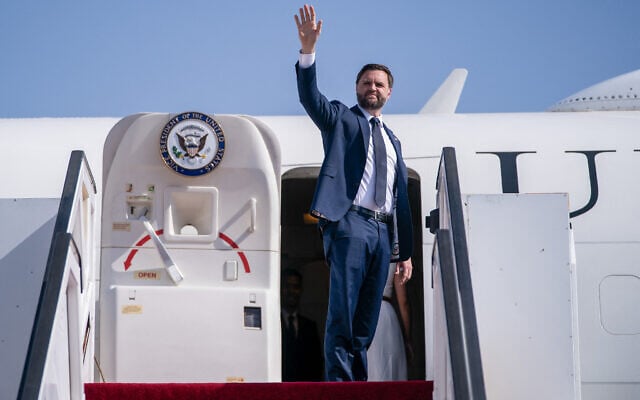
Vance said he was told it was a “political stunt” and “purely symbolic,” but that it was a “very stupid political stunt, and I personally take some insult to it.”
“The West Bank is not going to be annexed by Israel,” he said. “That will continue to be our policy, and if people want to take symbolic votes they can do that, but we certainly weren’t happy about it.”
Though the statement quickly dominated headlines in Israel, it did not appear to be a central message Vance was looking to convey at the end of his trip, and he made in response to a question on the matter after already concluding a short press conference.
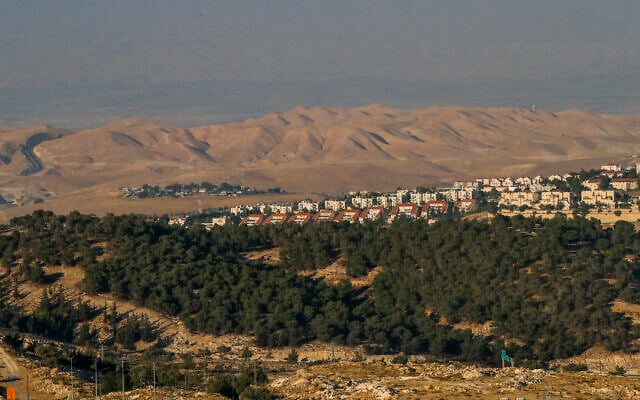
Previous visits to Israel by American vice presidents have also been marred by West Bank developments that Netanyahu failed to control. In 2010, the Interior Ministry approved the construction of 1,600 new apartments in East Jerusalem during a visit by then-vice president Joe Biden that had been quite friendly, angering the US administration at the time.
Vance wasn’t the first senior US official to publicly criticize the vote. US Secretary of State Marco Rubio said Wednesday night that the Knesset’s move toward annexing the West Bank could threaten Trump’s plan to end the Israel-Hamas conflict in Gaza.
“They passed a vote in the Knesset, but the president has made clear that’s not something we’d be supportive of right now,” Rubio told reporters before taking off for Israel. “We think there’s potential for [it to be] threatening to the peace deal.”
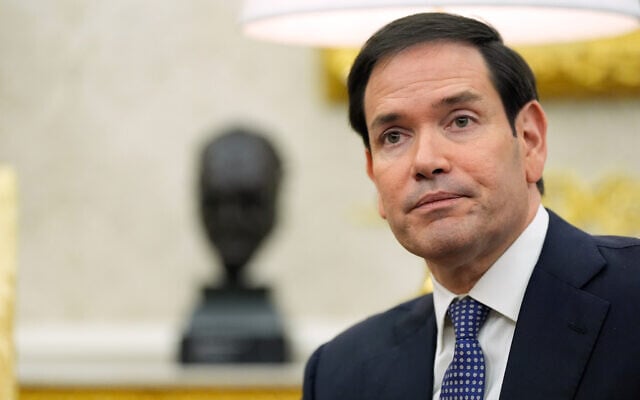
All but one Likud lawmaker boycotted the Knesset votes on annexation: MK Yuli Edelstein broke ranks to vote in favor, casting a decisive vote and helping the bill on annexation of all settlements scrape by at 25-24.
After the criticism from Vance, Netanyahu’s office said the vote “was a deliberate political provocation by the opposition to sow discord during Vance’s visit to Israel.”
“The two bills were sponsored by opposition members of the Knesset,” the PMO said in a statement sent out in English. “Without Likud support these bills are unlikely to go anywhere.”
The broader of the two bills was sponsored by far-right MK Avi Maoz of the one-man Noam party — who was part of the coalition until he left earlier this year.
In a separate statement, Netanyahu’s Likud party dismissed the bills as “trolling” by the opposition “aimed at damaging our relations with the US and Israel’s great achievements in the campaign” in Gaza.
“We strengthen settlement every day with actions, budgets, construction, industry, and not with words,” the party said.
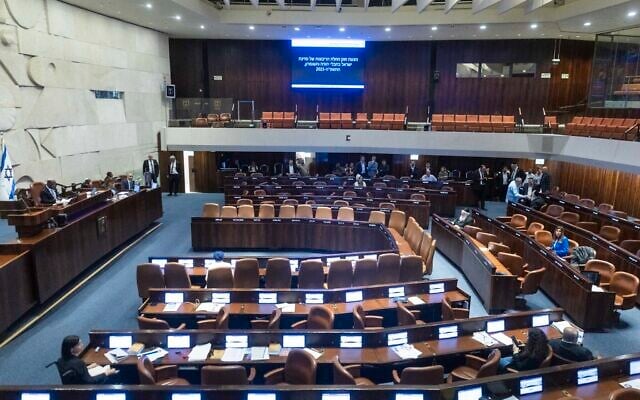
After Vance’s statement, Foreign Minister Gideon Sa’ar called the vote “a political move of the opposition to try to embarrass the government during the visit of Vice President JD Vance.”
“The government hadn’t participated in the vote, and that demonstrates our approach,” he stressed.
The issue is tricky for Netanyahu, whose hard-right base is broadly supportive of annexation. Many in Netanyahu’s coalition have been loudly calling to advance annexation as a response to the recognition of a Palestinian state by Western powers last month. In early September, Finance Minister Bezalel Smotrich publicly called for the annexation of 82 percent of the West Bank, even as Arab nations in the region warned that such a move would spell the end of Israel’s integration into the Middle East.
Other senior members of the cabinet, including Justice Minister Yariv Levin and Defense Minister Israel Katz, have also endorsed annexation. This summer, the Knesset overwhelmingly approved a nonbinding motion in favor of applying Israeli sovereignty in the West Bank.
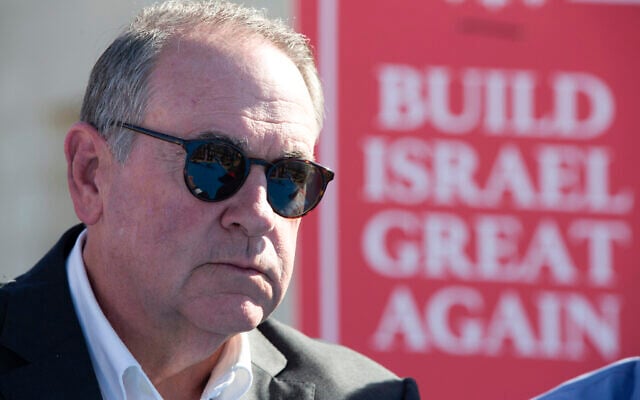
Kan news reported last week that the Prime Minister’s Office was concerned that any efforts to annex the West Bank could spark a diplomatic crisis with Washington. Without US support, Israel is much less likely to go ahead with the move, which would at any rate have diminished significance without backing from the world’s leading superpower, and which would doubtlessly spark massive international backlash.
Palestinians in Gaza ‘don’t have a leader’
In his Time interview, Trump said that he would visit the Gaza Strip at some point.
“They don’t have a leader right now, at least a visible leader, and they don’t really want to, because every one of those leaders has been shot and killed. It’s not a hot job,” said Trump.
Asked about Palestinian Authority President Mahmoud Abbas as the potential leader, with the PA retaking control of Gaza, Trump said: “I’ve always found him reasonable, but he’s probably not… I’d really have to find out. I’d have to seek it out, but so it would be a little bit early to make an opinion, but at some point I’ll have an opinion.”
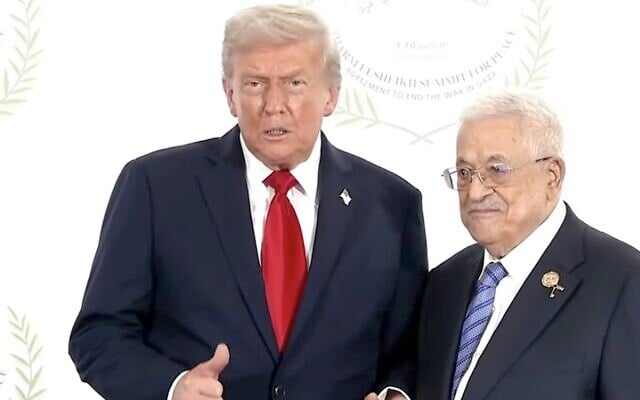
Trump also said on the Gaza ceasefire: “I said to Bibi, ‘Bibi, you can’t fight the world. You can fight individual battles, but the world’s against you. And Israel is a very small place compared to the world.'”
The US president continued, “You know, I stopped him, because he would have just kept going. It could have gone on for years. It would have gone on for years. And I stopped him, and everybody came together when I stopped, it was amazing.”
He called Israel’s attempted strike on Hamas leaders in Qatar a “mistake” that was “terrible,” but said it created momentum toward the deal.
“And when he made that one tactical mistake, the one on Qatar, and that was terrible, but actually, and I actually told the emir, this was one of the things that brought us all together, because it was so out of joint that it sort of got everybody to do what they have to do.”
Trump also said he was dealing with the issue of imprisoned political leader Marwan Barghouti, and would make a decision on whether he wants Israel to free the convicted terrorist, who is seen as a highly popular potential leader by Palestinians.
Hamas ‘respecting ceasefire’
Asked about the ceasefire in Gaza, Vance said on Thursday that “right now, we can say with confidence that Israel is respecting the ceasefire, Hamas is respecting the ceasefire.”
“There are exceptions,” said Vance. “There are little exceptions that break out here and there. That would be expected when these parties have been at war for two years. But so far, the ceasefire is actually holding, the peace is actually holding and now we’re trying to figure out how to make it stick over the long term.”

Some of those “exceptions” have been seen as quite severe by Israel. On Sunday, Palestinian gunmen launched an attack on Israeli forces in the Rafah area of the southern Gaza Strip, killing two soldiers and wounding several. This prompted the Israel Defense Forces to launch heavy strikes for several hours in response. The IDF said the attack was “a blatant violation of the ceasefire agreement.”
Hamas is also still holding the remains of 13 slain hostages in Gaza, though it has handed over 15.
“Our message is — do whatever you can to work with us to make this peace stick,” Vance said of his message to Israel.
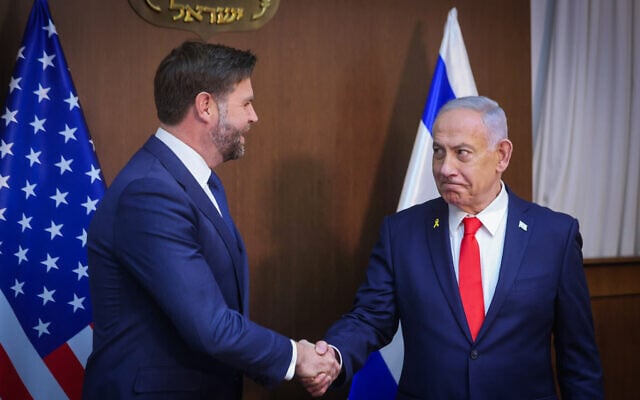
Citing American and Israeli officials familiar with the discussions, Channel 12 news said Vance urged Netanyahu on Wednesday to give Washington time to roll out the peace plan, to which the premier responded by showing a readiness to cooperate in the next phases.
In a separate report, however, the network said that Netanyahu outlined several red lines to the US in recent days, including absolute opposition to any Turkish presence in the Gaza Strip and to the Palestinian Authority or Hamas playing a governing role there after the war. He is also said to have insisted that a full IDF withdrawal would only take place after Hamas is fully disarmed and the Strip demilitarized.

A new international security force “is now going to take the lead in disarming Hamas” in Gaza, Vance said at the airport.
“That’s going to take some time, and it’s going to depend a lot on the composition of that force,” he continued. “There are certain countries who I expect will be quite good at it, and there are other countries that can play a role but I don’t think are going to be quite as useful. But a lot of that depends on which forces actually come to bear and how we’re actually able to implement phase two of the peace plan.
“We can always pick up the phone and call Hamas, at least through an intermediary, when we want to,” said Vance when asked if there have been recent conversations with the terror group. “But most of our communication has been with our Gulf Arab friends and, of course, with the Israelis about what this international security force is going to look like. That is not primarily a Hamas conversation. That’s a conversation between us, the Saudis, the Emiratis, the Qataris, and other folks who are going to be involved in this in one form or another.”
Earlier on Thursday, Defense Minister Israel Katz told Vance that Israel is “committed to bringing back all the fallen hostages, to disarming Hamas, and to ensuring a better future for the region,” according to his office.

